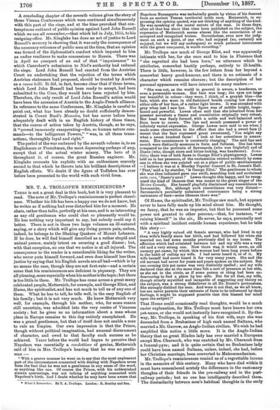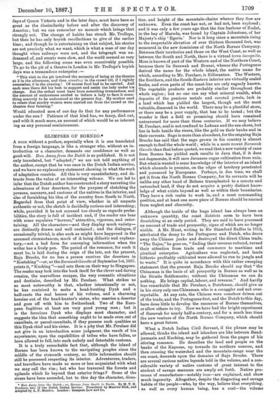MR. T. A. TROLLOPE'S REMINISCENCES.* Tum is not a great
deal in this book, but it is very pleasant to read. The note of Mr. Trollope's reminiscences is perfect cheeri- ness. Whether his life has been a happy one we do not know, but he writes as if nothing had ever disturbed him for a moment. He chats, rather than talks, perfectly at his ease, and is as interesting as any old gentleman who could chat so pleasantly would be. He has nothing very important to say, but nobody could say it better. There is not in these two large volumes an ill-natured Baying, or a story which will give any living person pain, unless, indeed, he belongs to the Shaking Quakers of Mount Lebanon. If he does, he will find himself described as a rather stupid and animal person, mainly intent on securing a good dinner; but, with that exception, no one that we notice is at all injured. The consequence to the reader is a considerable liking for the writer, who never puts himself forward, and even does himself less than justice by saying that his English novels are all bad—which is by no means the case, though they are not first-rate—and a certain sense that his reminiscences are deficient in piquancy. They are all pleasing, more especially when his mother is the topic; but there is too little in them. Mr. Trollope has come across a great many celebrated people, Metternich, for example, and George Eliot, and Hume, the spiritualist, and has not much to tell us of any one of them. What he has to tell, he tells well, in the easy English of his family ; but it is not very much. He knew Metternich very well, for example, through his mother, who, for some reason still uncertain, was admitted into the very centre of Viennese society ; but he gives us no information about a man whose place in Europe remains to this day entirely unexplained. He was a grand gentleman, but that of itself does not enable a man to rule an Empire. Our own impression is that the Prince, though without political imagination, had unusual discernment of character, and owed to that faculty such success as he achieved. Years before the world had begun to perceive that Napoleon was essentially a condottiere of genius, Metternich said of him in Mrs. Trollope's hearing that he was no gentle- man :— " With a graver manner he went on to say that the most unpleasant part of the circumstance connected with dealing with Napoleon arose from the fact that he was not a gentleman in any sense of the word, or anything like one. Of course the Prince, with his unblemished sixteen quarterings, was not talking of anything connected with Napoleon's birth. And I doubt whether he may have been aware that • What I Remember. By T. A. Trolleys. London.: B. Bentley and Bon. Napoleon Baonaparte was technically gentle by virtne of his descent from an ancient Truman territorial noble race. Metternich, in ex- pressing the opinion quoted, was not thinking of anything of the kind. He was speaking of the moral nature of the man. In these days, after all that has sines that time been published on the subject, the expreseion of Metternich seems almost like the enunciation of an accepted and recognised truism. Nevertheless, even now the judg- ment on such a point, of one who had enjoyed (no, certainly not enjoyed, but we will say undergone) no mach personal intercourse with the great conqueror, is worth recording."
Mr. Trollope saw much of George Eliot, and was apparently intimate with her, for she once said to him in Florence that "she regretted she had been born," an utterance which he
attributes, somewhat hastily perhaps, entirely to ill-health. There is little, however, in the few letters from her beyond a
somewhat heavy good-humour, and there is no estimate of a character which remains obscure ; but the description of her personal appearance will have interest for many readers :—
" She was not, as the world in general is aware, a handsome, or even a personable woman. Her face was long; the eyes not large nor beautiful in colour—they were, I think, of a greyish blue—the hair, which she wore in old-fashioned braids coming low down on either side of her face, of a rather light brown. It was streaked with grey when last I saw her. Her figure was of middle height, large. boned and powerful. Lewes often said that she inherited from her peasant ancestors a frame and constitution originally very reheat. Her head was finely formed, with a noble and well-balanced arch from brow to crown. The lips and month possessed a power of infinitely varied expression. George Lewes once said to me when I made some observation to the effect that she had a sweet face (I meant that the face expressed great sweetness), Yon might say what a sweet hundred faces ! I look at her sometimes in amaze- ment. Her countenance is constantly changing.' The said lips and month were distinctly sensuous in form and fullness. She has been compared to the portraits of Savonarola (who was frightful) and of Dante (who, though stern and bitter-looking, was handsome). Some- thing there was of both faces in George Eliot's physiognomy. Lewes told us in her presence, of the exclamation uttered suddenly by some one to whom she was pointed out at a place of public entertainment —I believe it was at a Monday Popular Concert in St. James's Hall. 'That,' said a by-stander, 'is George Eliot.' The gentleman to whom she was thus indicated gave one swift, searching look and exclaimed sotto core, 'Dante's aunt!' Lewes thought this happy, and he recog- nised the kind of likeness that was meant to the great singer of the Divine Comedy. She herself playfully disclaimed any resemblance to Savonarola. But, although such resemblance was very distant- Savonarola's peculiarly unbalanced countenance being a strong caricature of hers—some likeness there was."
Of Hume, the spiritualist, Mr. Trollope saw much, but appears never to have fully made up his mind about him. He thought, we fancy, that he was an impostor, but that he possessed some power not granted to other persons,—that, for instance, "of raising himself" in the air., He never, he says, personally met with a spiritual incident outside human experience, but he tells this story :—
" A very highly valued old female servant, who had lived in my then wife's family since her birth, and had followed her when she married me, had some months previonely died in my house. The affection which had subsisted between her and my wife was a very old and a very strong one. Now there was it would seem, an old nursery pet-name, by which this woman had been long years before in the habit of calling my wife. I had never heard it, or of it. My wife herself had never heard it for very many years. She and the old servant had never for years and years spoken on the subject. Bat one evening this pet-name was very distinctly spelled ; and my wife declared that she at the same time felt a sort of pressure at her side, as she sat in the circle, as if some person or thing had been en. deavouring to find a place by her side. Bat for all that, my wife, though utterly mystified and incapable of suggesting any theory on the subject, was a strong disbeliever in all Mr. flume's pretensions. She strongly disliked the man. And were it not that, as we all know, her sex never permits their estimate of facts to be influenced by their feelings, it might be supposed possible that this biassed her mind upon the alibied !"
That Mime could occasionally read thoughts, would be a much easier explanation, for Mrs. Trollope must have known her own_ pet-name, or she would not instantly have recognised it. By-the- way, Mr. Trollope, in speaking of his first wife, says she was descended from a Brahminee of high rank named Sultana, who married a Mr. Garrow, an Anglo-Indian civilian. We wish he had amplified this notice a little more. It is the Anglo-Indian. theory that no great Hindoo lady has ever married a European except Mrs. Charnock, who was snatched by Mr. Charnook from a (moral-pyre ; and it is quite certain that no Brahminee lady could have been named Sultana, unless, indeed, she had, before her Christian marriage, been converted to Mahommedanism.
Mr. Trollope's reminiscences remind us of a regrettable lacuna. in the memoirs of this century. Many who have died within it must have remembered acutely the differences in the customary thoughts of their friends in the pre-railway and in the post- railway periods ; but no one has intelligently described them. The dissimilarity between men's habitual thoughts in the early days of Queen Victoria and in the later days, must have been as great as the dissimilarity before and after the discovery of America ; but we can remember no memoir which brings that strongly oat. The change of habits has struck Mr. Trollope, but then be has only boyish recollections to give of the earlier time; and though he is entertaining on that subject, his stories are not precisely what we want, which is what a man of our day thought when railways were not, and the telegraph was un- dreamed of, and events were slow, and the world seemed so very large, and the following scene was even conceivably possible. To go to the pit of a theatre in London in Mr. Trollope's boyish days was a tremendous enterprise :—
" This visit to the pit involved the necessity of being at the theatre at 2 in the afternoon, and then standing in the crowd till, if I rightly remember, 6 in the evening ! Of course food had to be carried. And each man there did his beet to support and assist the lady under his charge. But the ordeal must have been something tremendous, and the amount of enthusiasm needed to induce a lady to face it some. thing scarcely to be understood at the present day. My mother used to relate that sundry women were carried out from the crowd at the theatre door fainting."
Would educated men of one day do that for any performance under the sun P Patience of that kind has, we fancy, died out, and with it much more, an account of which would be as interest tag as any personal reminiscences.























































 Previous page
Previous page